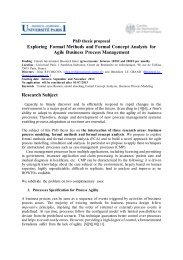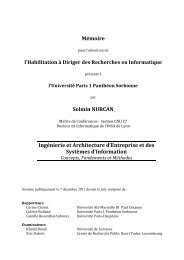IEEE COPYRIGHT FORM - CRI
IEEE COPYRIGHT FORM - CRI
IEEE COPYRIGHT FORM - CRI
You also want an ePaper? Increase the reach of your titles
YUMPU automatically turns print PDFs into web optimized ePapers that Google loves.
<strong>IEEE</strong> <strong>COPYRIGHT</strong> <strong>FORM</strong> 149-00-0001<br />
Rev 9/93<br />
The <strong>IEEE</strong> has developed this form with great care and with the best interests of its members and contributing authors in mind.<br />
Therefore, in order to maintain uniform treatment among all contributors, Company or other forms may not be substituted for this<br />
form, nor may any wording of this form be changed. This form is intended for original, previously unpublished material submitted to<br />
<strong>IEEE</strong> periodicals and conference publications. This form, when completed, must accompany any such material in order to be<br />
published by the <strong>IEEE</strong>. Please read it carefully and keep a copy of it for your files.<br />
TITLE OF WORK (hereinafter, “the work”):<br />
AUTHOR(S):<br />
PUBLICATION TITLE/DATE:<br />
PART A – <strong>COPYRIGHT</strong> TRANSFER <strong>FORM</strong><br />
(U.S. Government employees whose work is not subject to U.S. copyright should so certify by signing Part B overleaf. Authors of<br />
works subject to Crown Copyright should sign Part C overleaf.)<br />
The undersigned hereby assigns all copyright rights in and to the above work to The Institute of Electrical and Electronics<br />
Engineers, Inc. (the “<strong>IEEE</strong>”). The undersigned hereby represents and warrants that the work is original and that he/she is the author<br />
of the work, except possibly for material such as text passages, figures, and data that clearly identify the original source, with<br />
permission notices from the copyright owners where required. The undersigned represents that he/she has the power and authority<br />
to make and execute this assignment.<br />
In return for these rights, the <strong>IEEE</strong> recognizes the retained rights noted in items 1 and 4 below, and grants to the above authors and<br />
employers for whom the work may have been performed a royalty-free license to use the material as noted in items 2 and 3. Item 5<br />
stipulates that authors and employers must seek permission to republish in cases not covered by Items 2, 3, and 4.<br />
1. Employers (or authors) retain all proprietary rights in any process, procedure, or article of manufacture described in the work.<br />
2. Authors/employers may reproduce or authorize others to reproduce the above work, material extracted verbatim from the above<br />
work, or derivative works for the author's personal use or for company use provided that the source and the <strong>IEEE</strong> copyright notice<br />
are indicated, that the copies are not used in any way that implies <strong>IEEE</strong> endorsement of a product or service of an employer, and<br />
that the copies themselves are not offered for sale. (See "Author/Employer Rights" overleaf.)<br />
3. Authors/employers may make limited distribution of all or portions of the above work prior to publication if they inform the <strong>IEEE</strong> of<br />
the nature and extent of such limited distribution prior thereto.<br />
4. In the case of work performed under a U.S. Government contract or grant, <strong>IEEE</strong> recognizes that the U.S. Government has<br />
royalty-free permission to reproduce all or portions of the above work, and to authorize others to do so, for official U.S. Government<br />
purposes only, if the contract/grant so requires. (Appropriate documentation may be attached, but <strong>IEEE</strong>'s Copyright Form MUST<br />
BE SIGNED. See “U.S. Government Employees/U.S. Government Contract Work” overleaf.)<br />
5. For all circumstances not covered by Items 2, 3, and 4, authors/employers must request permission from the <strong>IEEE</strong> Copyrights<br />
Office to reproduce or authorize the reproduction of the work or material extracted verbatim from the work, including figures and<br />
tables.<br />
Please see notes on “<strong>IEEE</strong> Obligations” as copyright holder.<br />
In the event the above work is not accepted and published by the <strong>IEEE</strong> or is withdrawn by the author(s) before acceptance by the<br />
<strong>IEEE</strong>, this agreement becomes null and void.<br />
____________________________________________________________________________________________<br />
AUTHORIZED SIGNATURE<br />
TITLE<br />
____________________________________________________________________________________________<br />
EMPLOYER FOR WHOM WORK WAS PER<strong>FORM</strong>ED (if applicable)<br />
DATE<br />
____________________________________________________________________________________________<br />
AUTHOR’S DAYTIME PHONE FAX E-MAIL<br />
JOINT AUTHORSHIP:<br />
For jointly authored works, all the joint authors should sign, or one of the authors should sign as an authorized agent for the others.<br />
In the case of multiple authorship where one or more authors are Government employees but at least one author is not, that non-<br />
Government author should sign Part A of this Form.
PART B – U.S. GOVERNMENT EMPLOYEE CERTIFICATION<br />
Authors who are U.S. Government employees are not required to sign Part A of the <strong>IEEE</strong> Copyright Form, but any coauthors<br />
outside the U.S. Government are required to sign Part A (see JOINT AUTHORSHIP overleaf). Authors whose work was performed<br />
under a U.S. Government contract or grant, but who are not Government employees, are required to sign Part A of this form (see<br />
item 4 under Part A). Signing Part B will certify that ALL authors of the above work are employees of the U.S. Government and<br />
performed this work as part of their official duties and that the work is therefore not subject to U.S. copyright protection.<br />
____________________________________________________________________________________________<br />
AUTHORIZED SIGNATURE<br />
TITLE<br />
____________________________________________________________________________________________<br />
NAME OF GOVERNMENT ORGANIZATION<br />
DATE<br />
PART C – CROWN <strong>COPYRIGHT</strong><br />
Authors who are employees of the British Government (or a -British Commonwealth Government) and whose works are subject to<br />
Crown Copyright, may sign Part C below. <strong>IEEE</strong> recognizes and will honor Crown Copyright as it does U.S. Copyright. It is<br />
understood that, in asserting Crown Copyright, <strong>IEEE</strong> in no way diminishes its rights as publisher. Signing Part C will certify that ALL<br />
authors of the above work are subject to Crown Copyright. (Appropriate documentation and instructions regarding wording of Crown<br />
Copyright notice may be attached.)<br />
____________________________________________________________________________________________<br />
AUTHORIZED SIGNATURE<br />
TITLE<br />
____________________________________________________________________________________________<br />
NAME OF GOVERNMENT ORGANIZATION<br />
DATE<br />
Notes and Information for Authors and Their Employers<br />
<strong>IEEE</strong> POLICY:<br />
In connection with its publishing activities, it is the formal policy of the <strong>IEEE</strong> to own the copyrights to all copyrightable material in its<br />
technical publications, and to the individual contributions contained therein, in order to protect the interests of the <strong>IEEE</strong>, its authors<br />
and their employers, and, at the same time, to facilitate the appropriate re-use of this material by others. The <strong>IEEE</strong> distributes its<br />
technical publications throughout the world and does so by various means such as hard copy, microfiche, microfilm, and electronic<br />
media. It also abstracts and may translate its publications, and articles contained therein, for inclusion in various compendiums and<br />
similar publications, etc. When an article is submitted for publication to the <strong>IEEE</strong>, the <strong>IEEE</strong> understands that its acceptance of the<br />
article implies that <strong>IEEE</strong> has the rights to do all of the things it normally does with such an article.<br />
<strong>IEEE</strong> Policy 6.17 – Clearance of Papers – applies to all material submitted to <strong>IEEE</strong>: “The <strong>IEEE</strong> must of necessity assume that<br />
material presented at its meetings or submitted to its publications is properly available for general dissemination to the audiences<br />
these activities are organized to serve. It is the responsibility of the authors, not the <strong>IEEE</strong>, to determine whether disclosure of their<br />
material requires the prior consent of other parties and, if so, to obtain it.”<br />
Furthermore, the <strong>IEEE</strong> must assume that, if an author uses within his/her article previously published and/or copyrighted material<br />
that permission has been obtained for such use and that any required credit lines, copyright notices, etc. are duly noted.<br />
<strong>IEEE</strong> OBLIGATIONS:<br />
In exercising its rights under copyright, the <strong>IEEE</strong> will make all reasonable efforts to act in the interests of the authors and employers<br />
as well as in its own interest. In handling third party reprint/republication requests for an <strong>IEEE</strong> work, <strong>IEEE</strong> requires that: 1) the<br />
consent of the first-named author be sought as a condition in granting republication (of a full paper) to others; and 2) the consent of<br />
the employer be obtained as a condition in granting permission to others to re-use all or portions of a paper for promotion or<br />
marketing purposes.<br />
AUTHOR/COMPANY RIGHTS:<br />
If you are employed and you prepared your paper as part of your job, the rights to your work rest initially with your employer. In that<br />
case, when you sign the copyright transfer form, we assume you are authorized to do so by your employer and that your employer<br />
has consented to all the terms and conditions of this form. If not, it should be signed by someone so authorized. (See also Policy<br />
6.17 above.)<br />
SPECIAL NOTE TO EMPLOYERS: Just as the <strong>IEEE</strong> requires a signed copyright transfer form (for copyrightable material) in order<br />
to do “business as usual,” it is the intent of the transfer portion of the form to return rights to the author and employer so that they,<br />
too, may do “business as usual.”<br />
Please note that, although authors are permitted to reuse all or portions of their <strong>IEEE</strong>-copyrighted material in other works, this does<br />
not include granting third party requests for reprinting, republishing or other types of re-use. ALL THIRD-PARTY REQUESTS<br />
MUST BE HANDLED BY THE <strong>IEEE</strong> <strong>COPYRIGHT</strong>S & PERMISSION OFFICE.<br />
PLEASE DIRECT ALL QUESTIONS ABOUT <strong>IEEE</strong> <strong>COPYRIGHT</strong> POLICY OR THIS <strong>FORM</strong> TO: Manager, Copyrights and<br />
Permissions, <strong>IEEE</strong> Service Center, 445 Hoes Lane, P.O. Box 1331, Piscataway, NJ 08855-1331. Telephone: (732) 562-3966.










